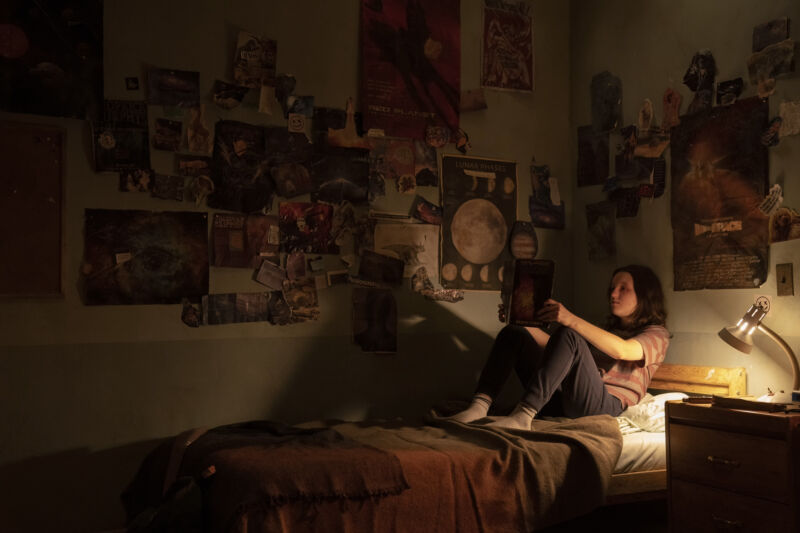
Enlarge / Even the apocalypse can't stop the standard teen wall full of posters...
New episodes of The Last of Us are premiering on HBO every Sunday night, and Ars' Kyle Orland (who's played the games) and Andrew Cunningham (who hasn't) will be talking about them here every Monday morning. While these recaps don't delve into every single plot point of the episode, there are obviously heavy spoilers contained within, so go watch the episode first if you want to go in fresh.
Andrew: We're back again! FLASH-back, that is!
This one isn't as big a departure from the action as the Bill episode was a few weeks back, but it does mean that last week's cliffhanger goes mostly unresolved. Ellie does take a crack at patching Joel up, though it seems to me that sticking a decades-old unsanitized needle into an open wound is just as likely to kill him as save him...
Kyle: If the flashback here seems a bit out of place it's probably because this storyline was originally part of the game's "Left Behind" DLC, which was written and released well after the first game came out. I'm not totally against putting it here in the show's narrative—it's important background that should go somewhere—but it does step on one of the more dramatic moments in the game (though maybe that's still coming in the future?)
Given how we first met Ellie as a prisoner in the show, I definitely appreciate giving a little more time to showing what she was like trying to grow up as a normal kid under FEDRA's version of society.
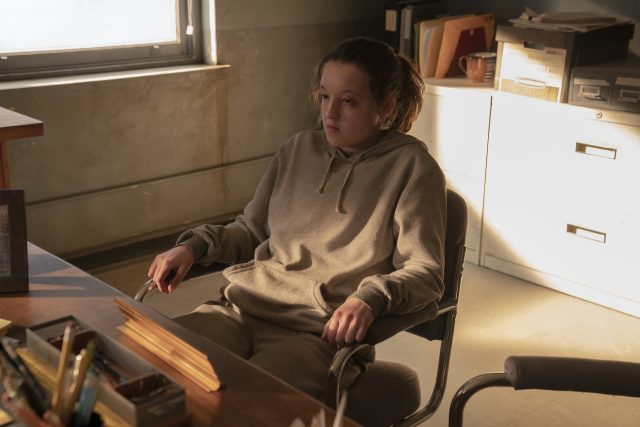
Bored teens look the same, even under FEDRA control. (credit: HBO)
Andrew: Yeah, I don't have a problem with the episode, and people watching this in the future when the whole season is available to binge straight through probably won't be as bothered by the delayed cliffhanger.
This does flirt with a thing that I can find frustrating in fiction, though—this impulse to show/explain every single little thing about a character instead of letting things be implied or a little mysterious. I'm not overly bothered by it here, but if TLoU stretches into a second or third season I could see them leaning on flashback-as-filler in a way that could be less interesting.
Did you ever wonder, viewers, about how Ellie got her knife? How Bill got his truck?! Tune in next week!
Kyle: In the game I believe it's set a few weeks before Ellie meets Joel, so let's go with that.
I was glad to see a well-acted version of Riley here, acting as a foil to push and pull Ellie in interesting directions. Even if I didn't know what was going to happen, though, I think it'd be pretty hard to get too attached to her. The pattern of "meet a new character; See them connect with the characters we love; Oops they're dead within an episode or two" is already getting a bit played out. It's possible to go to that well too often...
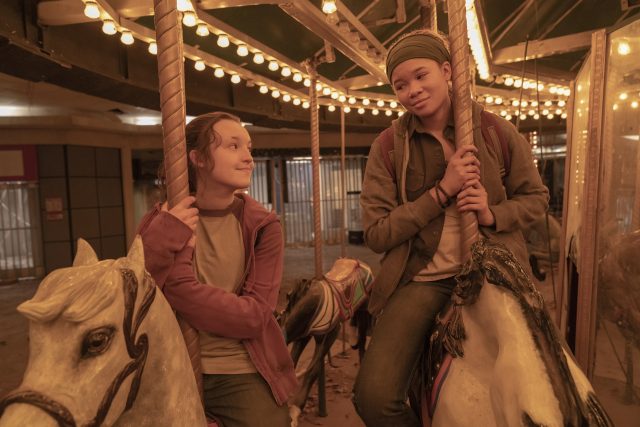
Don't get too attached, Ellie... (credit: HBO)
Andrew: Let's give some props to the set designers, though, who seem thrilled to work on something that isn't another run-down residential area. The design of the dilapidated, abandoned mall—the episode's big setpiece—has tons of fun details. I didn't go frame-by-frame to check and make sure that all the real stores mentioned/depicted were portrayed exactly as they would have been in September 2003, but the presence of an abandoned mall with all of its anchor stores intact is very true to the early '00s.
Other "society crumbled in September 2003!" things I liked: of course there would be a pop-up Halloween store in this mall, and Ellie is listening to a cut from 2002's Riot Act, the final in-universe Pearl Jam album. (Unless Eddie Vedder survived the apocalypse; of all the alternative rock stalwarts, he's the one I'd bet on, honestly.)
Kyle: I also liked all the little Ellie character callbacks that were paid off from earlier in the season: the pun book, Mortal Kombat II, even her interest in getting Joel's pistol can be traced to here somewhat.
I was kind of surprised that no one looted the lingerie store, though. You're telling me there's not a single sex-positive person who was worried about having enough hot nighttime wear to get through the apocalypse?
Kyle: Looter: "Do you have any idea what that lingerie is worth?" / Nick Offerman: "Presently, nothing..."
I wonder what you thought about Ellie and Riley's decision to "tough it out" at the end of the episode, rather than going out the painless, easy way. On the one hand, it is a pretty necessary thing for Ellie's narrative to continue. On the other hand, it's maybe a bit overly sentimental for these young, scared characters?
Remember how scared Sam was of turning just a few episodes ago? Or how Tess was willing to go out in a blaze of glory rather than face the same fate?
Andrew: That was the bit of the episode that felt the weirdest, to me. Like you said, not super consistent with how most characters we've seen approach the possibility of infection. But the "painless, easy way"... there's only one gun. Maybe the thought of being the person to go second was too horrifying for these teen girls (hardened, cynical teen girls, but teen girls nevertheless) to contemplate.
The scene might almost have worked better for me if the episode left off with that terrified look they share when they realize they've both been bitten. Ellie's still here, Riley isn't, let the audience imagine how that happened. Given the way the show uses flashback, I worry that we're going to have to return to this and watch Ellie gun down her best friend/putative girlfriend right at a point where the show needs to twist the emotional knife for some other reason.
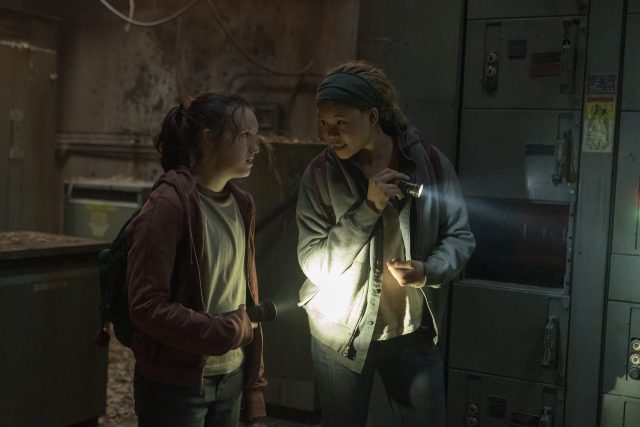
Whose flashlight is better? (credit: HBO)
Kyle:Strangely enough, this kind of tangentially reminded me of a holocaust survivor that spoke to my Hebrew School class when I was a teen. She said she was often asked, of her horrible years in a concentration camp, whether she ever considered just ending it all herself? What she said to us was simply: "I didn't want to save them the bullet." And 50 years later she was still around to tell us that.
Not exactly the same situation, but it came to mind...
Andrew: It does make you think about what motivates people to persevere in times of horror and hardship; it might be as simple as "where there's life, there's hope."
It could also be that Ellie and Riley are being a little selfish here. The other characters you mentioned, Tess and Sam, had other uninfected loved ones they clearly didn't want to infect. Ellie and Riley mainly have each other. What do you care if you infect some stranger, or some FEDRA goon? It's a bit of self-centered nihilism that, again, feels specific and true to teenhood.
You mentioned this was adapted from DLC, which like a episode of TV also needs to balance being its own standalone unit of story/gameplay and extending the main campaign. Seems to me like it would be especially easy to adapt directly without changing much, anything big that they've added or subtracted in adapting it for TV?
Kyle: There was also a big difference in the arcade. In the game, the arcade cabinet Ellie wants to play (a copyright-safe parody of Mortal Kombat) is busted. So Riley makes Ellie grab the controls and close her eyes while Riley describes what would be happening in an actual match. You have to respond to some quick time events while staring at a look of joy and concentration on Ellie's face and hearing imagined sound effects.
Probably hard to adapt that to a TV show in the same way, but I still think about that moment in the game. Kind of a "enjoy your games now, because these Apocalypse Kids can't even play them!" moment.
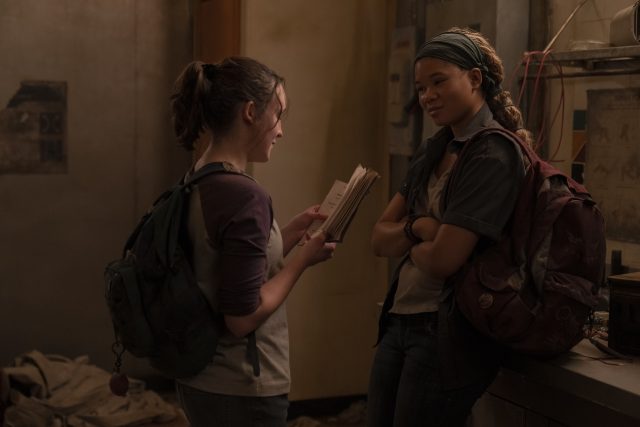
We'll always have puns... (credit: HBO)
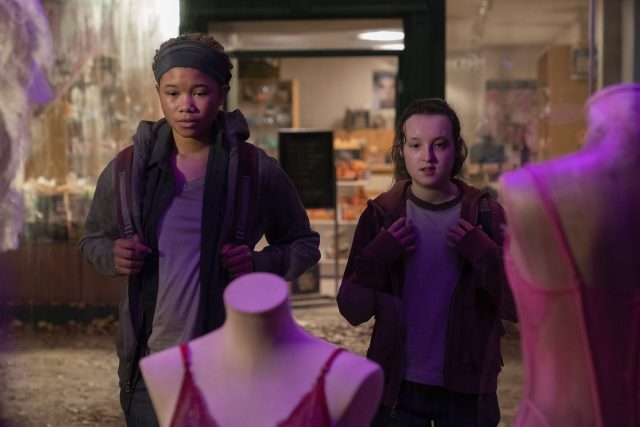
No comments:
Post a Comment